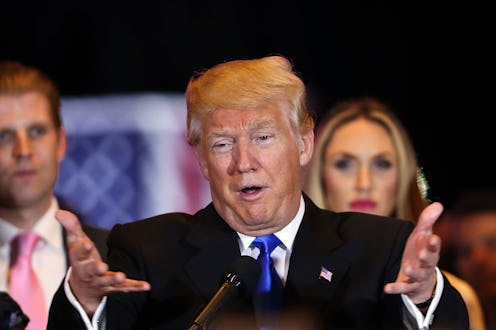News
In Trump's World: Be Nice To Melania, Or Else
In case you’ve been off the Internet for the last week, you might be unaware that Julia Ioffe’s GQ profile of Melania Trump earned her a boatload of anti-Semitic threats from the Trump faithful. Ioffe, who was born in Russia and is of Jewish descent, has been sent everything from the usual racist slurs to more creative endeavors, like images of her face photoshopped into various Holocaust tableau. On Wednesday, CNN’s Wolf Blitzer asked Donald Trump about the onslaught of anti-Semitism, and the fact that Trump hadn’t actually read the article in no way stopped him from saying it (the article, not the anti-Semitic backlash) was bad. He repeatedly called it “inaccurate” and “nasty,” and pretty much shrugged when Blitzer asked if the racist response concerned him.
“What’s your message to these people when something like that happens?” Blitzer asked.
“I haven’t read the article, but I heard it was a very inaccurate article,” Trump said. “And I heard it was a nasty article." He went on to pretty much talk about how awesome Melania is:
I’m married to a woman who’s a very fine woman. She’s a very fine woman. She doesn’t need this. Believe me. She was very, very successful, she did tremendously well as a top model, she made a lot of money. And she’s a nice person. And I guess some of the article says that she would go in at night and she would stay, she wasn’t a party person, you know, it’s not her thing. But this is a very high-quality woman who loves people and has a big heart. She doesn’t need to have bad things said about her.
Trump reiterated: "And I heard the article was nasty. Now, I haven’t read it, but I heard the article was not what it should be. They shouldn’t be doing that with wives, I mean they shouldn’t be doing that. Melania, as a top model, they sent pictures around to Utah, and it wasn’t even like a naked —" We get it, Trump. You hate the article, despite not reading it, and Melania is absolutely sacrosanct.
Of course, if Trump actually read the article before giving his opinion on it, he might have learned that it was neither inaccurate nor, in my opinion and many other readers', nasty. Yet, the barrage of anti-Semitism this journalist faced simply for shining a less than glowing light on Trump's wife didn't seem to concern the presumptive Republican presidential nominee.
“But these death threats that have followed, these anti-Semitic death threats,” Blitzer continued as Trump talked over him, “supposed fans of yours, posting these very angry — but your message to these fans is…?”
“I don’t have a message to the fans,” Trump said blithely. “A woman wrote an article that was inaccurate.” Meaning what, exactly? That she deserves the vile, anti-Semitic, violent threats she gets?
For her part, Ioffe seemed to take Trump's response in good stride. I guess after receiving a slew of anti-Semitic death threats, one learns to roll with the punches.
Trump's words very much remind me of his early refusal to distance himself from David Duke — “I don’t know anything about that.”
Granted, Trump is not directly condoning violence or anti-Semitism by refusing to condemn the tidal wave of threats that crashed over Ioffe in the wake of the article, but he’s coming far too close to doing so for my taste. And though he may not be actively condoning this horrible attack on Ioffe, I do believe he has a responsibility to criticize it in a forceful, decisive way. To me, Trump is conveying the message that such revolting, horrific threats of violence are no concern of his — as long as they are directed at someone he has chosen not to like.
